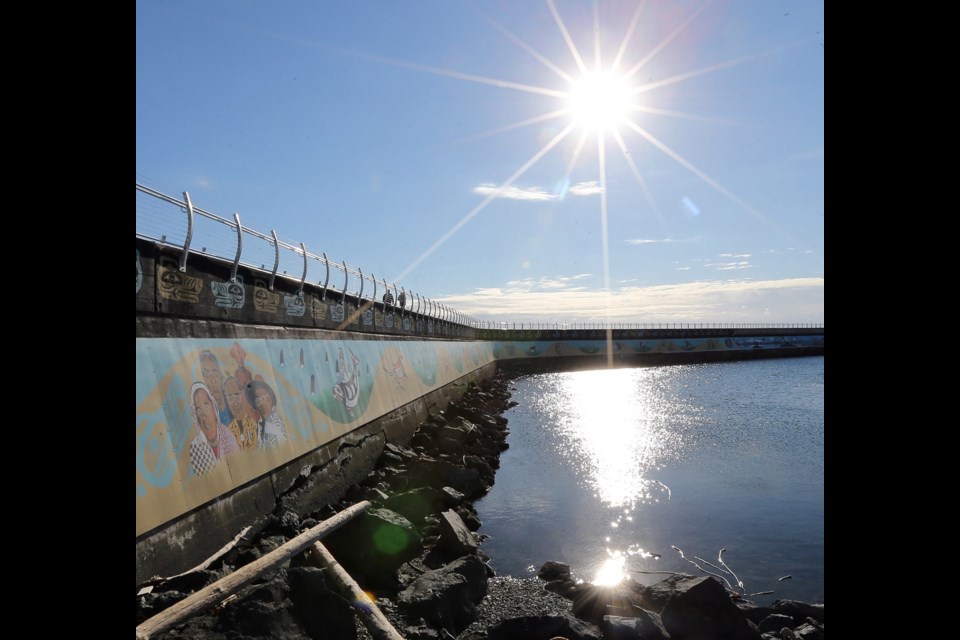After weathering countless ocean storms, a massive fire and even a few controversies through the decades, Ogden Point and its breakwater will be celebrated with a party on Sept. 23 — 100 years after the breakwater was completed.
The area was named in 1843 for Peter Skene Ogden (1790-1854), a fur trader and official with the Hudson’s Bay Company. Peter Skene Ogden Secondary School in 100 Mile House and Ogden, Utah, also bear his name.
Construction at Ogden Point came in reaction to the perceived need in the second decade of the 20th century for a major cargo terminal to service an influx of ocean-going vessels. Locals expected huge traffic would materialize with the completion of the Panama Canal in 1914 — but it didn’t. A breakwater was also part of the vision, and was considered to be better suited to Ogden Point than another option — nearby Holland Point.
Work on two piers and a warehouse began in 1913, and went on while crews put together the 762-metre-long, three-metre-wide breakwater that has since become a favourite walking and running spot for both locals and visitors.
Construction of the protective breakwater included bringing in 280,000 cubic metres of gravel from Albert Head for the foundation. The top of the breakwater was made out of more than 8,000 granite blocks.
The cost was $1.8 million.
Development at Ogden Point has been “hugely important” to the region, said Victoria’s Barry Gough, honorary president of the B.C. Historical Federation. Some vessels would have bypassed Victoria and headed to Vancouver if the breakwater had not been built, he said.
Gough said he remembers a different-looking Ogden Point during his childhood in the late 1940s.
“When I was a kid, there were big sheds down there, and there still are remnants of them, which were important for storage and transhipping and so forth,” he said. “And, of course, there were stevedores and dockside workers there hauling things back and forth.”
There have been many significant times over the years for Ogden Point, including the City of Victoria striking a deal with the Panama Pacific Terminal Elevator Co. Ltd. in 1925. The result was a facility that loaded Prairie grain into ships bound for international markets.
A disastrous fire struck Ogden Point in 1977, leading to a Times Colonist headline that read: “Spectacular blaze rips dock, warehouse.” The fire followed a “muffled explosion,” wrote former Times Colonist contributor Geoffrey Castle, and caused $3 million in damage.
That included the loss of 140,000 square feet of Canadian National Railway storage area and 6,800 tonnes of baled pulp, Castle wrote.
Thousands of people headed to the area to see what was happening, causing congestion on area roads. The sight of the flames led some Port Angeles residents to wonder if all of Victoria was ablaze, according to the Greater Victoria Harbour Authority, a not-for-profit society that owns and operates Ogden Point and other facilities.
Arson or some form of spontaneous combustion were suspected as possible causes.
In 1990, Ogden Point lost another piece of its history when the B.C. Packers cold-storage fish plant closed its doors after 65 years, putting 75 people out of work.
The landmark breakwater generated considerable debate in 2013 between people who were for and against the addition of safety railings. The $500,000 for the project came from the GVHA.
The authority said that both Labour Canada and its insurer had insisted on the addition of railings. Following the aluminum-and-stainless-steel railings’ installation, many people said that opportunities had been enhanced for use of the breakwater by people of all abilities.
Prior to that, efforts had begun to adorn the breakwater with First Nations art in what is known as the Unity Wall. It is made up of treated plywood panels designed by First Nations artists and painted by First Nations youth.
Work on the project began in 2009 with support from the harbour authority.
In recent years, the GVHA has been working on a master plan to revamp the 12 hectares that make up Ogden Point. Chief executive Ian Robertson has called the site a “blank canvas” that should be developed with local residents in mind.
Residents have been invited to take part in a public-participation process to help chart the future.
Cruise tourism has emerged as an increasingly vital part of Ogden Point, which is the busiest port-of-call for cruise ships in the country.
Ogden Point welcomed its one millionth cruise ship passenger in 2003, while the harbour authority has seen traffic grow from 110 ship calls with 161,000 customers in 2002 to a record of 227 ships carrying 533,000 customers in 2015.



